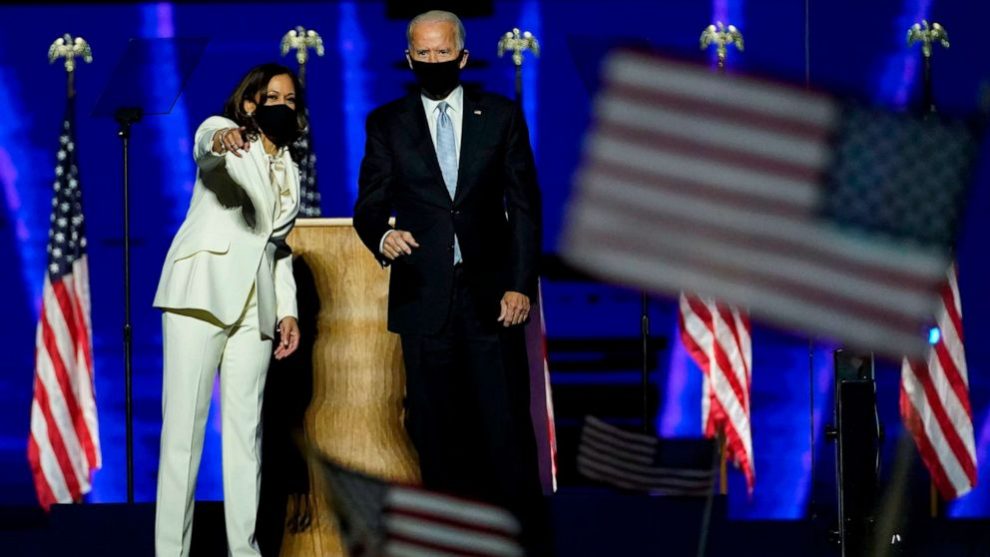National unity is at hand under President-elect Joe Biden, but not for the reasons he and his globalist handlers promote. A surprise political realignment of populists on the left and right is in play. Let the healing begin!
For decades, appearing to be an agent of change has been the key to success in establishment politics. Always ratcheting toward more favorable terms for the power elite, any policy change would be dressed up in a fashion that would assure sufficient divisions among the masses.
That way, even though no true change was made, the populace could be preoccupied with either defending or attacking the red or blue team’s head guy on any given day.
In 2021, a Biden-Harris administration may be expected to mandate mask-wearing for the whole nation or grant amnesty to tens of millions of illegal aliens or run a takeover of alternative school choices. As in years past, such policies would serve special interests, but unlike in prior years, there is less a guarantee that this political theater will be accompanied by the usual audience participation.
To the extent that the next administration seeks to consolidate all power within its grasp, it will also centralize the forces that roused masses of Americans to support either progressive or America First insurgent candidates in recent years, including 2020.
Three key issues highlight the fundamental disconnect between the rulers and the ruled. Any one of them should be compelling enough to overthrow the game table on which the establishment has long played.
First, there is the precious Federal Reserve, the crown jewel of the political establishment. The central bank inflated the money supply to record levels this year and ran a zero interest rate policy, neither of which has produced more bank lending. In fact, this monetary policy effectively transfers wealth from the bottom and middle economic strata to the very top, as the dollar’s spending power diminishes.
To obscure its role in hollowing out the middle class, the Fed now postures as a woke bank, loudly virtue-signaling that it aims to become more racially diverse and conscious of the planet’s plight. The young Bernie Sanders-style progressives, and certainly Trumpian conservatives, probably won’t fall for this public relations gimmick and could easily find common ground to demand transparency.
Thankfully, precedent already exists for bipartisan passage of a bill to audit the Fed. In 2014, the House overwhelmingly passed it with more Democrats than not joining with the nearly unanimous Republicans. In early 2016, a Fed audit nearly passed the Senate, with only 44 voting against it.
How about the endless wars? This may be the most glaring issue contrasting Biden with both the left and right wings of rising populism. He served a critical role in the Senate beating the war drums into Iraq, and was the ever-faithful VP during President Barack Obama’s interventions and war expansion into Syria, Libya, Yemen, and beyond.
Again, the young and hungry progressives in Congress shouldn’t be expected to feign admiration for token gestures such as Biden’s picking a black man to head up the Pentagon. Retired Army Gen. Lloyd Austin would be the first black person to be defense secretary, but he’s also just another board member of another arms manufacturer, Raytheon, that rakes in massive profits from the warfare state.
That’s not going to please Rep. Barbara Lee (D-CA), a longtime antiwar progressive who is also black, who shortly after the 2020 election issued a letter alongside fellow progressive Rep. Mark Pocan (D-WI) urging Biden to pick a defense secretary “with no prior employment history with a defense contractor.”
Lee, the sole vote against the 2001 Authorization for Use of Military Force in the House, would find natural allies in Republican Representatives Matt Gaetz of Florida, Thomas Massie of Kentucky, Paul Gosar of Arizona, and two dozen others who voted to limit Trump’s war powers in 2019.
Perhaps the hottest issue of all right now for coalition building is Big Tech and its power over the public forum and marketplace. Funnily enough, Biden himself advocated for reform of Section 230 in January 2020, but that was in the heat of the Democratic primary when he was also calling for an end to the coal industry.
Section 230 of the Communications Decency Act is a legal grant of non-liability for companies operating as third party platforms. While conservatives’ primary complaint is censorship, progressives admonish the gigantic corporations such as Facebook, Twitter, and YouTube for not regulating “hate speech” or “fake news” enough.
Professor Michael Rectenwald, author of Google Archipelago, makes a libertarian case against the “governmentalization of private industry” that should also appeal to anti-corporatist leftists. He points out that Facebook and Google got financial help early on either directly or indirectly from the CIA-backed In-Q-Tel venture capital firm.
Antitrust litigation is one strategy favored by firebrand Rep. Alexandria Ocasio-Cortez, and increasingly by MAGA Republicans as well. Ocasio-Cortez also reportedly has ambitions of rising up in the House Energy and Commerce Committee, which would cover Big Tech regulation.
Coalition efforts of the anti-establishment factions in Congress need not end in a president’s signature to produce substantial results. Audit the Fed legislation pushed the central bank into the limelight. Making Big Tech sweat and holding up the warfare state’s welfare are also worthwhile ventures for political outsiders whose value as fighters is remembered come next election season.
The establishment in Washington, D.C. better not relax.
Story cited here.
























